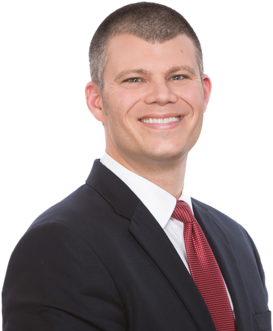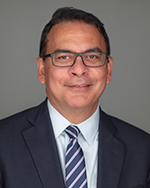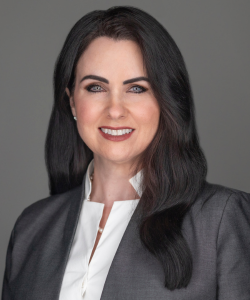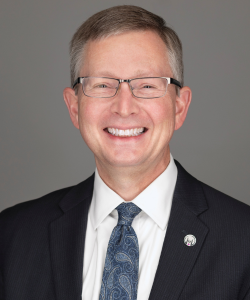Patient Experience Week: This is a Special Place
For Patient Experience Week, some of Moffitt Cancer Center’s leaders share their passion for patient care and gratitude for our dedicated staff. Moffitt’s heart begins and ends with the patients and that is the unifying force that guides all team members. It’s this definitive culture, characterized by compassion, empathy, and patient-centered care, that makes Moffitt a truly special place for both patients and staff alike.
For more stories, search for "Pep Talks with Moffitt" wherever you get your podcasts, or tune in and subscribe via our show page.
Podcast Transcript
CRISTINA PEREZ: Welcome to a special edition of Pep Talks. We have been celebrating our team members and our patients all week for Patient Experience Week. We had the chance to record some of our leaders, and here are a few of the highlights.
 MATT BEDNAR: Hey everybody, it's Matt Bednar, VP of ambulatory and virtual health operations.
MATT BEDNAR: Hey everybody, it's Matt Bednar, VP of ambulatory and virtual health operations.
I'm a big believer in rounding and trying to get out as much. You know that gets harder. The more you take on from a responsibility standpoint. When I'm out and about, I think what I'm most impressed by is just the natural compassion and I think the investment in our mission to the prevention and cure of cancer that I see on everybody's face and through everybody's actions, even when I know they might be having a difficult day. You are so intimately involved, whether you're a environmental services worker to a physician. Right. Um, front desk, researcher, right scheduler from home. Um, I think one of the beauties of maybe the work that we do, especially working in a place like Moffitt, is you're almost forced to be so involved.
So going back to the rounding, it's not only the compassion, the empathy and the going out of our ways to help our patients and families or each other, you see. But it's my own interactions with those patients and families and team members do. That's very different from the prior experiences in my life.
And I really believe in it's maybe an old school way of thinking, but once you put the name badge on, you're here to fulfill the mission regardless of what your role is. And, um, too often, as soon as we're in the elevator, you know, we're in front of patients and families. We all have our personal lives, and we all have our outside of work issues that consume our time, you know, good and bad. But if you do show up and you've had a bad day, or you've had a bad start to the day, you know, it really is our obligation to, put on a performance of sorts for our patients and families. And what I hope in my role and others that we're able to do is not make it worse for you when you're here, right, that you have the tools, that you have the resources, um, regardless of your role, to be productive and positive and enjoy the eight plus hours that you're at a Moffitt facility or if you're working from home contributing to the mission.
I hope that you take a moment to understand how much you mean. You know, not only to the success of what we're trying to achieve and do here both, you know, to curing cancer, but also every day meeting expectations of what our patients and families are coming to us for. But I hope you take the time to understand how meaningful you are to each other. Right. And we're only as good as we operate as a team. And again, that's regardless of what you do or where you work.
And so it takes a special person. I've learned. Right. So again, going back to all the things I've been either responsible for or involved in. Oncology, especially at an NCI, uh, I think it takes a very special person to show up every day and be a part of, again, the good and the bad of of what we are asked to do. And so this is a week where I would want you to reflect on, you know, those things and how much you mean to us and our success. And, you know, we're all going to be successful towards achieving the goal, right, of curing cancer one day. And, you know, we'll all be able to say at some point in time that we were a part of that.
CRISTINA PEREZ: Welcome, Sabi Singh, our chief operating officer for Moffitt Cancer Center.
 SABI SINGH: If you ask me today, you know, if I would ever consider any other field and my answer in a nanosecond would be no. Health care is what I really enjoy and I'm very passionate about it.
SABI SINGH: If you ask me today, you know, if I would ever consider any other field and my answer in a nanosecond would be no. Health care is what I really enjoy and I'm very passionate about it.
It's about people. It's about, you know, serving. It's about a purpose. And secondly is that you see the results sort of real time. Um, unlike in automotive industry where you are building something, but that's not going to be in production for many, many, many years. But here it's more purposeful because you are impacting lives. And the actions that you take go on to make a difference. And that's what fuels you, uh, every day. And you look forward to coming to work and trying to figure out how are you going to make a positive impact.
I won’t single out, you know, a particular area, but I would just say that the philosophy of Moffitt of keeping patient at the center of everything that we do, whether it's our care delivery models or improving the daily experience for our patients and their families, is top notch. We probably are among perhaps the top 1% of the health care organizations in the country, and that is very visible when you do rounding. And regardless of what level you talk to any employee in the hallways, they are cheerful. They know what the mission is and how they are impacting lives. And even if you are not having a great day, just interacting with them uplifts your spirits.
I think that's what's very special about Moffitt. If the foundational work at Moffitt done 35 years ago was to keep patients at the center. So we have to figure out ways, as leaders, that we do not deviate from that philosophy, that we always keep patient at the center, that we deliver care. And the care delivery model should be focused on that. Our quality and safety systems should be focused on the patient. Uh, keeping patient in mind. So so I think those are the things and they are very, um, achievable. It just requires diligence and it requires a collective feedback and energy from the frontline staff. Once the frontline staff who deliver the care, once they come up with the ideas, they are the ones who implement those, then those ideas are likely to sustain. And I think working with the frontline staff and the leaders and empowering them is what the real power is in terms of transformational change.
I think the team at Moffitt is, uh, just outstanding. They know the mission. They know the purpose. They have the values that keep us, uh, elevating that experience every day. I would say that the philosophy at the frontline, um, that was started 35 years ago, is not just still growing. It's expanding, and it's, um, impacting so many of us. It's rubbing off on all of us.
 KELLEY GONZALVO: My name is Kelly Gonzalvo. I am the vice president of patient care services and the chief nursing officer here at Moffitt Cancer Center. And I will tell you that I am so thankful that my professional journey led me here. And, um, I almost would say a little divine intervention guiding me along the way. I cannot say enough about how special, um, my career has been here at Moffitt and how special Moffitt is as a whole. It is really unlike any other place. You make such a profound difference in the lives of everybody you touch. Our patients, their caregivers, but also each other. There is a whole different atmosphere here of supporting each other. Uh, I've seen peers, uh, go out of their way for their for their colleagues and keeping them, um, motivated, energized. What they do outside of this organization together is inspirational. They're there for each other because we all have a sense of family when it comes to each other.
KELLEY GONZALVO: My name is Kelly Gonzalvo. I am the vice president of patient care services and the chief nursing officer here at Moffitt Cancer Center. And I will tell you that I am so thankful that my professional journey led me here. And, um, I almost would say a little divine intervention guiding me along the way. I cannot say enough about how special, um, my career has been here at Moffitt and how special Moffitt is as a whole. It is really unlike any other place. You make such a profound difference in the lives of everybody you touch. Our patients, their caregivers, but also each other. There is a whole different atmosphere here of supporting each other. Uh, I've seen peers, uh, go out of their way for their for their colleagues and keeping them, um, motivated, energized. What they do outside of this organization together is inspirational. They're there for each other because we all have a sense of family when it comes to each other.
I have to give a shout out to all of the folks that report up to me. Not just nursing, but also social work case management. Uh, folks that pull it all together every day and make that experience stellar for our patients. And I got to tell you, we do have, by and large, the best nurses that I've ever worked with in my entire life.
Some examples of how that comes out with our patients. Uh, we've had ICU nurses take dying patients outside. Their last wish. And I'm going to try not to cry. Um, was just to get some fresh air and some sun on their face. That didn't deter my nurses. They did what they needed to do. They wheeled the bed out, ventilator and all. Just so the patient could get that experience. We've had nurses. I can't tell you how many weddings that we've had here at Moffitt. That's the nurses pulling that together. They you know, this is how close we get to our patients and their families. And again, I think that's one of the things that makes us so very special is that we do have that profound connection with these patients that we, um, really get to know very well. Makes you want to go that extra mile. We’ve snuck pets into rooms before. That's the only thing we had. We had a young patient that that's all she wanted was her dog. So we managed. And actually, we did go through the proper channels to make it happen. Um, but that was led by the staff. I mean, you know, we've got the heartbeat in a bottle. Um, you know, that was generated that was the brainchild of our frontline staff. Our frontline staff is what truly does define us as an organization. Uh, and the experiences that they bring to these patients, buying food for them, they, you know, their patients, they they didn't like what was on the menu, even though shout out to Sodexo, they do a fantastic job, but they want a Chick-Fil-A. So what did my nurse do? She ran out, got Chick-Fil-A. It's just I'm just always in awe, every single day. And those wonderful stories. I'm so thankful to say they far outweigh any opportunities for improvement that come my way.
I gain my energy, joy, and inspiration from the staff. When I've had a rough week. Um, things just haven't gone quite the way that I had wanted to wanted them to. I go out and round. I spend time with the staff. I and that's what re-energizes me. Every day where I get down or frustrated, I want to do this. We need to do that. We can't get there because of whatever barriers are in our way. I look at folks that work for me, that report up to me, that I know are struggling with their own personal tragedies, with their own, um complications that come to all of us as adults. And I think, look at them. Look what they're doing. What the heck is wrong with me? I'm not. You know, I'm very blessed right now. I'm not going through what they are going through. So for me, it's about choosing my attitude. Now, sometimes I have to remind myself to choose the attitude. But there is nothing that I'm facing that is anywhere near what our patients are facing. Every day they walk through our doors and put their trust in our hands.
 TERRENCE WRIGHT: Terrence Wright. Vice president, facilities and support services here at Moffitt.
TERRENCE WRIGHT: Terrence Wright. Vice president, facilities and support services here at Moffitt.
Whenever I go to a new hospital or a new hospital network. Um, the biggest challenge I have is connecting mission and purpose. What do you do every single day, and how does it tied to the mission of the organization? That work was already done for me here at Moffitt. It is amazing how committed our team is here. And when I talk with people and engage with them, many of them have had a personal cancer journey right here at Moffitt. I have security staff to tell me. I came here as a patient, loved the place, decided to stay here and work. Uh, I came here with my father and I was amazed and thought, I love this culture and I want to work here. And that is one of the things that, um, is appealing about Moffitt and the things we do here.
You got to meet people with empathy and compassion. And, um, that's difficult for some people to try to do that. The between environmental services and food services, those are the greatest ambassadors in the entire organization. And when we sit down and we talk about customer service and our satisfaction scores. I tell them for our team, you're the team that has that interaction with the patient 2 to 3 times a day. We're passing the tray. We're retrieving the tray, we're cleaning the room. We're going back to check the room to make sure that you are the ones that are in that room, interacting with the patients every single day. You're a part of the face of Moffitt.
Um, I walk the facility all the time. I like to catch people doing the right thing. And, um, anytime I get an opportunity to not only witness someone doing the right thing, but then to kind of pull them aside after that interaction and just say thank you for that. I try to do that. The most recent one that I can think of is Liz at, uh, Common Grounds. She runs her coffee shop there, and Liz is amazing. Um, she's another one of those people that knows everyone’s name, knows your order and everything else. So I was up there rounding, and, a husband and wife came by and they stood there for a while, and they waited for Liz, and they asked her to come around from the back of the counter. And she did. And the wife told Liz he rang the bell today, and, um, he did not want to leave until he talked to you and said thank you. And that was amazing to make that personal connection with the patient, with their family member, so much so that they wanted to seek her out before they left. And you may think it's just a cup of coffee, but it's a cup of coffee. It's a word. It's a personal connection. It's me taking time to invest some time in you and making that connection.
The biggest thing for me is, again, that mission and purpose. When, um, I'm coming to work, I know that what I'm doing is making the difference. So that's part of what motivates me. It it gets to be burdensome at sometimes. And, um, I do this here at Moffitt, and I used to do that at other institutions whenever I get really burdened and it just it seems like it's too much. Uh, I'll go and stand in the waiting room. I'll go stand in the lobby. Uh, I'll walk by urgent care and to see the people that come and go in the institution. And it really reconnects mission and purpose.
So, you know, I'm here for that grandmother. Um, and what I'm going through, you know, administratively and trying to work with budgets and the people issues and some of those things means nothing. When you compare your situation with what they're going through and the fact that what I do every single day gives our doctors and our nurses and all of our staff the platform to be able to do what they do, forward facing touching those patients and doing that work. That kind of gets me recentered. And, uh, and then I can get back in the game. So, um, but my recommendation for people is to have balance to, to have a, a balance of, of how you approach your day and to understand that you do make a difference.
 BRIAN SPRINGER: Brian Springer Vice President, associate Center Director of research Administration. So, um, my my team's help support, uh, the research activities of our, our leaders and our faculty and our staff and team members. And, um, when people ask me about my job, I kind of usually talk about it. Uh, I'm a big music person, as you know, and I talk about my job, and I think about it as being like a music producer, where I get to work with scientific rock stars and clinical rock stars all day long and help them make it records. So that's kind of what my job is helping to do things, to support people, to do the science.
BRIAN SPRINGER: Brian Springer Vice President, associate Center Director of research Administration. So, um, my my team's help support, uh, the research activities of our, our leaders and our faculty and our staff and team members. And, um, when people ask me about my job, I kind of usually talk about it. Uh, I'm a big music person, as you know, and I talk about my job, and I think about it as being like a music producer, where I get to work with scientific rock stars and clinical rock stars all day long and help them make it records. So that's kind of what my job is helping to do things, to support people, to do the science.
Walking through the clinic has been one of the beats. I really like being on campus and being on this part. It's, um, it's a way bit from the labs that you get to walk through and see clinical care. I see patients, see caregivers, um, and seeing, uh, that it starts when they drive in and they meet the person, the valet driver. And, um, it's sometimes it's funny when you see people and they look like, they're struggling to say, hey, can I help you? But it's funny because sometimes I've noticed, like, there you go to start to talk to somebody and somebody else jumps in before you can even get there. So I'm like, okay, well, this is this is great. Um, we're all thinking about the patients we want them to be, um, to be have as smooth a care as they possibly can have. My why is patients too just like everybody's wives and patients.
So that's something that regardless of what you do at Moffitt. we're all working to help that cancer care and everybody can contribute in some way. You talk to somebody when you see them because, um, and say hello, introduce yourself or um, and that's just important because we're all in our guests here. They are trusting us with, with things that are sacred, which is the health and well-being, the care of they themselves, their parents, their siblings, their kids. And so everybody is really entrusting us with um. With their precious lives.
Every day I wake up, I know I've got a job to do, so I'm always excited to get to work. I mean, it's like it's one of those things when I wake up in the morning. Um, it just, uh, I can't get here fast enough, even though sometimes I'm doing a school drop off or something like that. So I'm always really just anxious to get here and get working because, um, we're all contributing to what's going to be impactful for our patients.
And so, um, we all have challenges, things to deal with, things that are frustrating. We all have them. But at the end, there's people counting on us. And so I'm like, okay, just get past that and focus on what's really important. And what's really important is making sure that we, um, save more lives. We impact more people. Um, we advance the science and the care, prevention, the diagnosis so that we are everybody recognizes when they come to Moffitt that they are coming to the best place on the planet for their cancer care.
CRISTINA PEREZ: As you heard from our leaders, our Moffitt culture is so special due to how patient centered we are. We have such a rich, compassionate, empathetic culture. Thank you for the difference you make in the lives of our patients and their caregivers each day.
